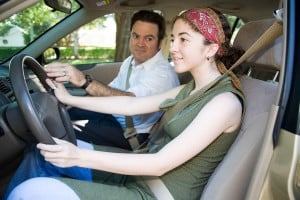As the parent of a teenager who may be driving soon, there can be a lot of worries and concerns that pop up through the process of a new driver obtaining a driver’s license. Because of the efforts of law enforcement and safety organizations that provide educational opportunities to students, as well as awareness campaigns in communities, many of our teenagers are better educated than we were about the dangers of driving. However, we also understand that driving today is different than when we were teenagers, and it is those differences that can be both reassuring and scary for parents.
Drivers up to age 25 pose the highest risk for an accident while driving, and most of this is related to inexperience with driving and normal development of the brain. This is why the majority of states in the U.S. have developed graduated or provisional driver’s licensing programs. These programs allow a new or teenage driver to slowly learn how to drive while eliminating risk factors like driving at night, driving with too many passengers in the car, or other distractions like cell phones or texting. With the advent of these, the risks to new and teenage drivers have been reduced significantly.
Drinking and driving is another concern for a parent of a teenage driver. While no teenager can legally obtain alcohol, teenagers are still drinking and then driving. All 50 states have a “zero tolerance” policy when it comes to the Blood Alcohol Concentration (BAC) of a teenager, meaning that if a teenage or underage driver has any alcohol in his or her blood, then there will be a DUI/DWI charge filed against that person. Parents should understand that their expectations of their teenage driver are much more effective in eliminating a DUI/DWI risk, or any other driving distractions, than driver’s education classes or awareness campaigns.
Letting a teenager take the keys and drive can be a harrowing experience even for the most relaxed parent, but, with the right guidance, teenage drivers can grow to be safe, adult drivers. Always be sure to discuss driving habits and dangers with your teenager, and set your expectations high. The risks of not involving your concerns certainly outweigh the benefits of keeping the peace in the family.


Leave a Reply
You must be logged in to post a comment.